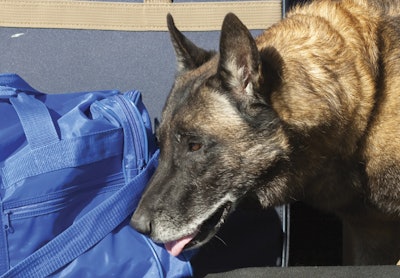 K-9s are only trained to recognize certain explosives and might miss some. Understand that even after a clean sweep you can't say with absolute certainty that there are no explosives on a campus. (Photo: iStockphoto.com)
K-9s are only trained to recognize certain explosives and might miss some. Understand that even after a clean sweep you can't say with absolute certainty that there are no explosives on a campus. (Photo: iStockphoto.com)
In every call for service, you should think things through before you begin your response. Each call can be broken down into three phases: pre-response, response, and post-response. The following scenario is designed to help you think things through rather than give you a specific way to handle the call.
Situation
It's 13:30 on a Tuesday and dispatch advises you that someone called the local middle school saying he planted a bomb and it is set to go off at 14:30, just as school lets out. The only witness, the school's receptionist, stated the caller had a voice that sounded like an adult male. Dispatch can advise no further information except that the school is enacting its protocols for a bomb threat and is waiting for law enforcement's response. The School Resource Officer is off duty and not available.
Initial Thoughts
You handle about 10 of these calls each school year. In your entire career, you have never found anything suspicious. You know that school administrators know the same thing and most feel that following the established protocols is a waste of time. They worry more about keeping to their school schedules. This principal in particular has always given you a hard time. She just can't be bothered and does only the minimum necessary to go through the motions. If you looked up bad attitude in the dictionary, there would be a picture of her pointing a finger at your face. But that doesn't mean you won't do your job.
Pre-Response
Think It Through Questions
- How many people are needed to secure the area?
- How many people are needed to search the school?
- Is a K-9 team available?
- Do we have a bomb disposal unit available in case we find something?
You have but one response strategy; do it by the book. You couldn't care less that the principal is having a bad day. You get officers going to the location as fast as possible. You need to close off access to the school, ensure the students are out of and preferably off campus, and you need to make sure the school is empty at least 30 minutes before the threatened explosion time. You secure a communications channel and advise your chain of command. You also notify your agency PIO to respond so he can help deal with parents and phone calls in case the situation extends past the scheduled school bus service time. The clock is ticking and you have less than an hour to get things done.
Response
Think It Through Questions
- What roads do I have to close and how will I divert traffic?
- Can I get more than one K-9 to help with the search (to combat dog burnout)?
- How am I going to deal with the principal who automatically assumes it's a prank call?
- What staging areas do I need?
The first thing you need to do is reroute traffic around the school. You also need to establish a command post. Once those two things are done, you need to make sure that the evacuation of the school is complete. The best practice is to get students off-campus without leaving them out in the open, which would leave them vulnerable to sniper attacks. You worry because you have little control over the students. Unless your agency has made prior arrangements with the school board, the school principal has the final say.
As the K-9 unit arrives and more of your troops get there, you start an outer perimeter search. You are looking for something suspicious. The problem is, what's suspicious? You don't work there every day so how will you know? Will you have a groundskeeper or maintenance person searching with you? It's just like searching inside the school; only the teachers really know what is in their rooms. Your K-9 is only trained to identify certain explosive compounds, so even after a clean sweep you can't say with any authority it's safe to go back in.
Some of the tactics we use are archaic; we do them to say we did. If there were to be a real bomb hidden somewhere in the school, the chances of our finding it are slim. We could walk right by one and never know it. The people who are best at knowing what should and shouldn't be there seldom search with you or check on their way out of the building. This is our real purpose for evacuating. We may not find the bomb but we can hopefully stop people from getting hurt by getting them out of the blast zone.
Once the inner and outer search is done and your staging areas are set (EMS, parent pick-up, etc.), the only thing left to do is wait. Some agencies wait half an hour past the deadline and some wait longer. Once the agreed upon amount of time passes you turn to the principal and give her the standard speech. You tell her that you have done the best you can do and still can't guarantee that there isn't a bomb in the school. It's her call to decide when to let everyone go back inside. She thanks you sarcastically and gets the students ready for the buses, which was her main concern in the first place. You already convinced her to hold the buses 30 minutes past their scheduled departure time and she is not happy.
Post Response
Think It Through Questions
- Did I interview and get a statement from the receptionist?
- Did I collect all possible evidence?
- Did I conduct a good debrief with everyone to see how we can do it better next time?
- Is there any way we can improve our response by suggesting policy changes?
The rest of the call is handled like any other crime. You take a statement from the person who received the call. The officer assigned the report documents all the steps and measures that were taken. You clearly state in the report what was said to the principal. If the principal gave you any grief, make sure that's documented as well. You need to identify a list of students who are possible troublemakers. You need to identify a list of possible disgruntled parents. You also need to check for any employees who have been recently fired. You hold a quick debrief including members of the school's administration and identify the good, bad, and ugly. You plan on taking a look at policy and see where it can be changed.
Final Thoughts
Bomb threat calls have always fascinated me because in my 28 years of being in law enforcement, they have been handled the same way. Most of what we do is window dressing. What really concerns me is that we usually evacuate students into an open field, making them easy targets.
I had a principal who always caused me grief when we had a bomb threat at her school. One time she started loading kids onto the buses before we had even finished our search. She told me she couldn't be bothered with a prank call and that when I showed her a bomb she would worry about it then.
Unfortunately, bomb threats are treated much like fire alarm drills. People just go through the motions for looks. I think that revamping our response is long overdue. There are always multiple possibilities and potential responses. Thinking it through now saves you time later.
Amaury Murgado is a special operations lieutenant with the Osceola County (Fla.) Sheriff's Office. He has over 28 years of law enforcement experience and is a retired master sergeant from the Army Reserve.














